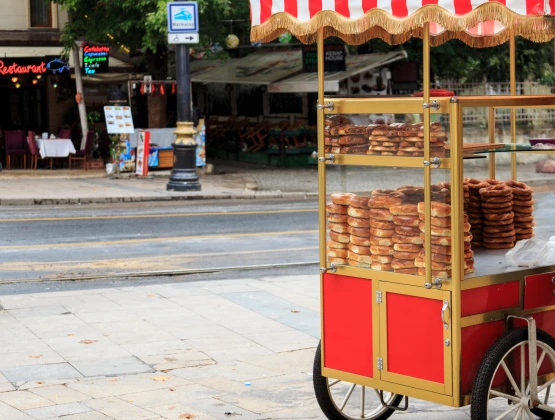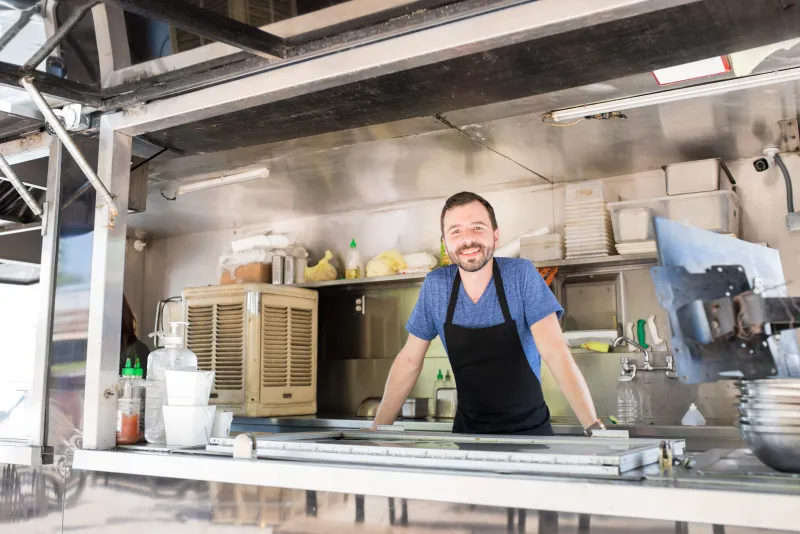Food Cart Insurance

What Is Food Cart Insurance?
Food cart insurance is a type of business insurance designed to protect mobile food vendors who operate carts rather than full-sized trucks. It typically includes general liability coverage to help pay for injuries or property damage that might occur while serving customers, as well as property insurance to cover equipment, inventory, and supplies if they’re stolen, lost, or damaged. Depending on where you operate, you may also need commercial auto insurance for any vehicles used to transport your cart and workers’ compensation insurance if you have employees. Whether you’re selling hot dogs on a sidewalk or running a gourmet coffee cart at events, food cart insurance helps safeguard your business from unexpected costs and legal claims so you can focus on serving customers.
Who Needs Food Cart Insurance?
Anyone who owns or operates a mobile food business—such as a food cart, food truck, or concession stand—needs food cart insurance. Whether you’re selling tacos, coffee, ice cream, or gourmet meals, insurance is essential to protect your business against risks like customer injuries, property damage, theft, and auto accidents. Even if your cart is small or operates seasonally, you can still be held legally and financially responsible for unexpected incidents. Many cities and event organizers also require proof of coverage before granting permits or allowing you to set up near popular venues, including restaurants, breweries, or arenas. Having proper insurance gives you peace of mind and helps keep your business running smoothly, no matter where you serve your customers


Types of Food Cart Insurance
There are several types of food cart insurance that help protect your business from various risks. The most common is general liability insurance, which covers third-party injuries or property damage—for example, if a customer slips and falls near your cart. Commercial property insurance protects your equipment, inventory, and cart against damage or theft. If your food cart is towed or driven, commercial auto insurance may be necessary to cover vehicle-related accidents. If you have employees, you’ll likely need workers’ compensation insurance to cover medical costs and lost wages due to on-the-job injuries. Many insurers also offer a Business Owner’s Policy (BOP) that bundles general liability and property coverage at a discounted rate. Together, these policies ensure that your food cart is financially protected in the event of accidents, lawsuits, or unexpected losses.
Food Cart Insurance Costs
Food cart owners face many of the same risks as traditional restaurants. Whether you serve gourmet hot dogs, tacos, or smoothies, the right insurance for your restaurant business is essential.
How Much Does It Cost to Insure a Food Cart?
The cost of restaurant insurance for a food cart is generally lower than for brick-and-mortar establishments, but it still depends on several factors:
Your location (for example, restaurant insurance in San Diego can cost more due to higher liability exposure)
The type of food you serve
Your annual revenue
How many employees you have
On average, food cart insurance costs range from $400 to $2,500 per year, depending on the coverage you choose. This is often considered cheap restaurant insurance compared to large restaurants and bars.
Typical Coverage Options
Most food carts carry a combination of policies similar to fast food restaurant insurance or bar restaurant insurance, including:
✅ General Liability Insurance for Restaurants
Protects you if a customer gets hurt or their property is damaged. For food carts, this is often the most important coverage.
✅ Commercial Auto Insurance (if you tow your cart)
Covers damages to your towing vehicle and liability in case of accidents.
✅ Property Insurance
Helps replace or repair your equipment if it’s stolen or damaged by fire or vandalism.
✅ Workers’ Compensation Insurance
Required in most states if you have employees.
✅ Commercial Insurance for Restaurants and Bars
Some insurers offer packages that bundle coverages at discounted rates.
Get a Quote Today
If you’d like personalized policy guidance or an exact price for insuring your food cart business, our specialists are here to help.
We understand the unique risks involved in running a food cart, and our agents can often lower your premium by offering additional discounts of 10% to 15% off the instant quotes you receive. Take a moment to call us and review your options.
We deliver the most comprehensive plans for your business, offering:
Licensed insurance agents with extensive experience
Same-day coverage in most cases
Policies backed by A-rated insurance carriers
Nationwide coverage availability
The lowest rates for the best food cart insurance in the industry
Get in Touch
Access resturent insurence anytime, anywhere.

On average, food cart insurance costs between $400 and $2,500 per year, depending on your location, the coverage you select, and the size of your operation. Compared to traditional restaurants, this is usually more affordable.
Several factors impact your premium, including:
The type of food you serve
Where you operate (city regulations, foot traffic)
Annual revenue
Whether you have employees
Claims history
Coverage limits you choose
General liability insurance isn’t always legally required, but many cities and event organizers will demand proof of coverage before issuing permits or allowing you to operate. Commercial auto insurance is mandatory if you drive a vehicle for business.
To get affordable rates:
Compare quotes from multiple insurers
Bundle coverages in a Business Owner’s Policy (BOP)
Ask about discounts for safe operations and no prior claims
Choose only the coverages you truly need
While the coverage types are similar, food cart insurance is tailored to mobile operations and usually costs less than insurance for brick-and-mortar restaurants or bars.
Yes—many providers offer policies with nationwide coverage, but be sure to confirm your policy meets each state’s requirements.
